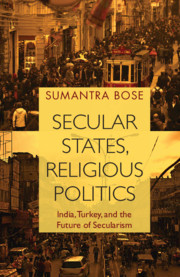Book contents
1 - The Discontents of Secularism
Published online by Cambridge University Press: 20 October 2018
Summary
In 1945, the Turkish lexicon prepared by the Turkish Language Association provided the following in its entry for religion: ‘An idea or ideal to which one fervently adheres. Kemalism is the religion of the Turk’.
In 1961 I asked an Indian professor why he supported the principle of the secular state. The reply was: ‘Because I have always been a nationalist’.
For decades after the formation of the Republic of Turkey in 1923 and the Republic of India in 1950 as sovereign nation-states, the principle of ‘secularism’ (laiklik or laicism in Turkey) was held to be a cornerstone of both state and nation in the two countries. It was seemingly impossible to think of national identity without reference to the ‘secular’ principle, or to conceive of the state without reference to its ‘secular’ character. In Turkey, as the first epigraph above conveys, the official ideology of nation-statehood had supplanted Islam – the religion of the vast majority of the population – with a new creed of ‘Kemalism’ named after the Turkish Republic's founding leader Mustafa Kemal, known after 1934 as Ataturk (Father of the Turks). Under Kemal's leadership, a series of radical reform measures were enacted starting in 1924 to make Turkey a secular state. In 1928, Article 2 of the Republic's Constitution, which had stated that ‘the religion of the Turkish state is Islam’ was summarily deleted. The secularizing drive culminated in 1937, a year before Kemal's death, when Turkey was constitutionally declared a ‘laicist’ state.
The word ‘secular’ did not feature in India's Constitution until 1976, when it was inserted via an amendment made during a relatively brief, 18-month period of authoritarian rule known as the ‘Emergency’. Nonetheless, that multi-religious India was a ‘secular state’ became a central tenet of the official discourse during the 1950s and the state-sanctioned version of Indian nationalism incorporated secularism as a core principle of independent India's identity. In March 1950, two months after the proclamation of the Republic of India's Constitution, Prime Minister Jawaharlal Nehru wrote to Vallabhbhai Patel, his Home (interior) Minister and Deputy Prime Minister, ‘We talk of a secular state.
- Type
- Chapter
- Information
- Secular States, Religious PoliticsIndia, Turkey, and the Future of Secularism, pp. 1 - 40Publisher: Cambridge University PressPrint publication year: 2018



